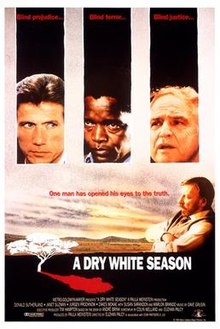
Marlon Brando Jr. was an American actor. Widely regarded as one of the greatest cinema actors of the 20th century, Brando received numerous accolades throughout his career, which spanned six decades, including two Academy Awards, three British Academy Film Awards, a Cannes Film Festival Award, two Golden Globe Awards, and a Primetime Emmy Award. Brando is credited with being one of the first actors to bring the Stanislavski system of acting and method acting to mainstream audiences.
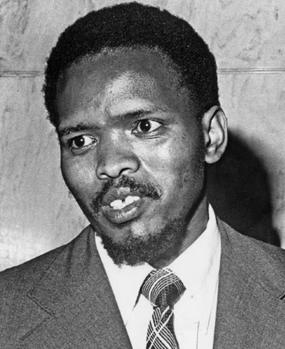
Bantu Stephen Biko OMSG was a South African anti-apartheid activist. Ideologically an African nationalist and African socialist, he was at the forefront of a grassroots anti-apartheid campaign known as the Black Consciousness Movement during the late 1960s and 1970s. His ideas were articulated in a series of articles published under the pseudonym Frank Talk.
Dame Janet Suzman is a South African-born British actress who had a successful early career in the Royal Shakespeare Company, later replaying many Shakespearean roles on television. In her first film, Nicholas and Alexandra (1971), her performance as Empress Alexandra Feodorovna earned her several honours, including a nomination for the Academy Award for Best Actress.

Helen Suzman, OMSG, DBE was a South African anti-apartheid activist and politician. She represented a series of liberal and centre-left opposition parties during her 36-year tenure in the whites-only, National Party-controlled House of Assembly of South Africa at the height of apartheid.

"Master Harold"...and the boys is a play by Athol Fugard. Set in 1950, it was first produced at the Yale Repertory Theatre in March 1982 and made its premiere on Broadway on 4 May at the Lyceum Theatre, where it ran for 344 performances. The play takes place in South Africa during apartheid era, and depicts how institutionalized racism, bigotry or hatred can become absorbed by those who live under it. It is said to be a semi-autobiographical play, as Athol Fugard's birth name was Harold and his boyhood was very similar to Hally's, including his father being disabled, and his mother running a tea shop to support the family. His relationship with his family's servants was similar to Hally's as he sometimes considered them his friends, but other times treated them like subservient help, insisting that he be called "Master Harold", and once spitting in the face of one he had been close to. Additionally the play was remade for a suitable audience in 2005.
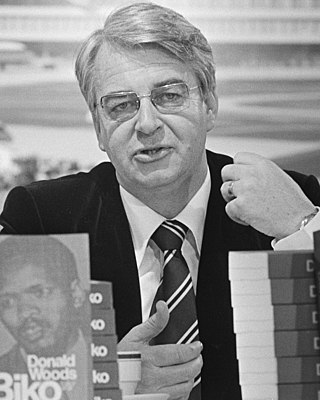
Donald James Woods was a South African journalist and anti-apartheid activist. As editor of the Daily Dispatch, he was known for befriending fellow activist Steve Biko, who was killed by police after being detained by the South African government. Woods continued his campaign against apartheid in London, and in 1978 became the first private citizen to address the United Nations Security Council.

Zakes Makgona Mokae was a South African stage and screen actor. He was well-known for his work with playwright Athol Fugard, notably in The Blood Knot and "Master Harold"...and the Boys, the latter earning him a Tony Award for Best Featured Actor in a Play.
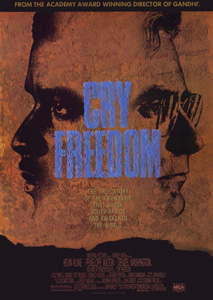
Cry Freedom is a 1987 epic biographical drama film directed and produced by Richard Attenborough, set in late-1970s apartheid-era South Africa. The screenplay was written by John Briley based on a pair of books by journalist Donald Woods. The film centres on the real-life events involving South African activist Steve Biko and his friend Woods, who initially finds him too radical, and attempts to understand his way of life. Denzel Washington stars as Biko, while Kevin Kline portrays Woods. Penelope Wilton co-stars as Woods' wife Wendy. Cry Freedom delves into the ideas of discrimination, political corruption, and the repercussions of violence.

Euzhan Palcy is a French film director, screenwriter, and producer. Her films are known to explore themes of race, gender, and politics, with an emphasis on the perpetuated effects of colonialism. Palcy's first feature film Sugar Cane Alley received numerous awards, including the César Award for Best First Feature Film. With A Dry White Season (1989), she became the first black female director to have a film produced by a major Hollywood studio, MGM.
Blood Knot is an early play by South African playwright, actor, and director Athol Fugard. Its single-performance premier was in 1961 in Johannesburg, South Africa, with the playwright and Zakes Mokae playing the brothers Morris and Zachariah.

There is a wide range of ways in which people have represented apartheid in popular culture. During (1948–1994) and following the apartheid era in South Africa, apartheid has been referenced in many books, films, and other forms of art and literature.

Master Harold...and the Boys is a 1984 American made-for-television drama film by Athol Fugard, adapted from his 1982 play of the same title, directed by Michael Lindsay-Hogg. The film originally premiered on Showtime on November 12, 1984 and was also aired on PBS as a presentation of Great Performances on November 15, 1985.
Mathilda Marie Berthilde Paruta, better known as Darling Légitimus, was a French actress. In 1983, she received the Volpi Cup for Best Actress for her performance in the film Sugar Cane Alley.
The Governors Awards presentation is an annual award ceremony hosted by the Academy of Motion Picture Arts and Sciences (AMPAS), at the Grand Ballroom of the Hollywood and Highland Center, in the Hollywood district of Los Angeles, California. Three awards that signify lifetime achievement within the film industry – the Academy Honorary Award, the Jean Hersholt Humanitarian Award, and the Irving G. Thalberg Memorial Award – are presented at this ceremony. The first Governors Awards ceremony was held on November 14, 2009. Prior to this, these three awards were formally presented during the main Academy Awards ceremony, which now conducts a short mention and appearance of the awards recipients after displaying a montage of the Governors Awards presentation. In the years since, the awards have gained prominence as a major red-carpet destination and industry event.

The 14th Toronto International Film Festival (TIFF) took place in Toronto, Ontario, Canada between September 7 and September 16, 1989. In Country by Norman Jewison was selected as the opening film.
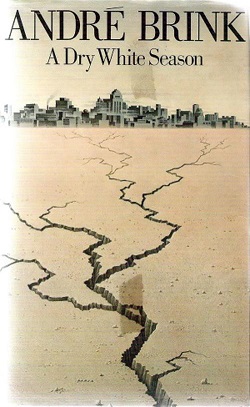
A Dry White Season is a novel written by Afrikaner novelist André Brink and first published by Taurus in 1979. The title quotes a line from the struggle poem For Don M. - Banned by Mongane Wally Serote. The novel focuses on the death during detention of a man wrongly suspected of being a black activist. The novel challenges apartheid, depicting the transformation of a ruling class Afrikaner's opposition to the governing white supremacist regime. The novel was initially banned in South Africa, though Brink had managed to get 3,000 copies published through an underground press.
Thoko Ntshinga, is a South African actress, director, translator, community theatre facilitator and arts activist. She is best known for the roles in the television serials such as; Egoli: Place of Gold, Interrogation Room and The River.
